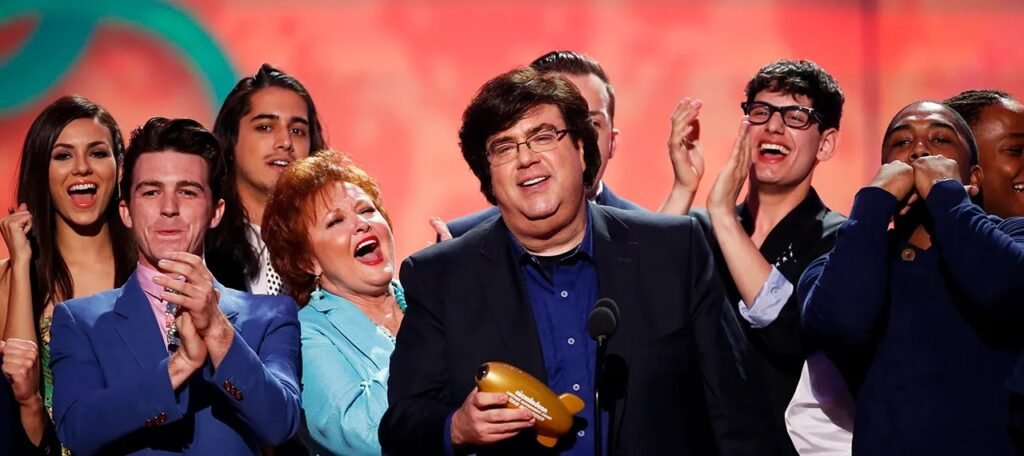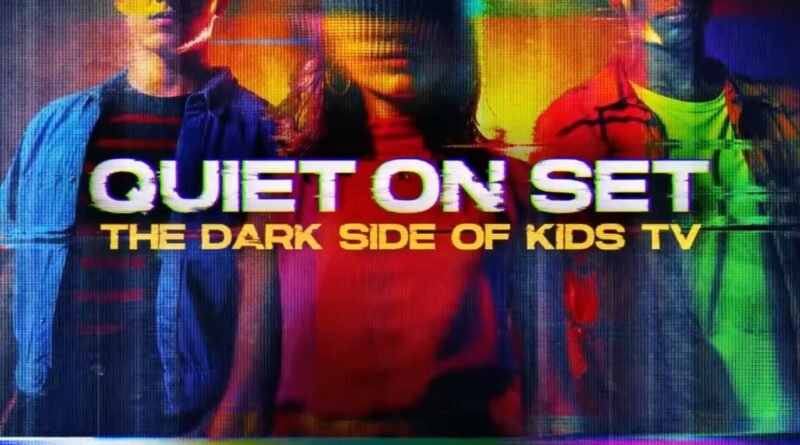Review: Quiet on Set: The Dark Side of Kids TV (2024)
Update: Dan Schneider is (surprise, surprise) suing the makers of the documentary for defamation. It’s exactly what I thought was going to happen. If there were bizarre fetishes and desires that had to be hidden from view, Schneider would not sue. With a lawsuit, Schneider solidifies some level of innocence, perhaps not complete innocence, but if somebody were to put together a documentary about how terrible and perverted I am (or was), I might be perturbed. This documentary has no receipts. There is no proof either way of Schneider’s proclivities, and that is the mistake. You don’t make a movie and distribute accusations without some level of proof.
I’m sorry, but looking and sounding creepy is not a crime.
Quiet on Set: The Dark Side of Kids TV, 2024 (Drake Bell) Sony Pictures Television/Investigation Discovery
Okay. Let’s say you have a boss you really hate. I mean really, really hate. Ooh. Okay. Never mind. There was a great piece of dialogue in Alfred Hitchcock’s Rear Window where Jeff’s cop friend, Tom Doyle (played by Wendell Corey, a part I also played in our high school stage play version, It Had To Be Murder), tells him, “People do a lot of things in private that they couldn’t explain in public.”
You’re in trouble if you’re an employer with secrets and a bunch of bitter ex-employees all gang up to craft a multi-episode documentary about how terrible you were, or the little things you did that made them go, “hmmm…” I didn’t want to take this route with a review of Quiet on Set: The Dark Side of Kids TV because, like everybody else, I want to hate Dan Schneider. There’s something about him that’s, for lack of a better word, icky. Icky.

He likes feet. He’s into feet. He has a foot fetish. He has a little girl foot fetish. Okay. We get it. Have you been to the Internet? If it isn’t cat pictures and videos, it’s feet. Lots of feet! Everywhere. You can’t escape it. Dan Schneider is really, really into feet. His swimming pool is shaped like a damned foot with little toes where his jacuzzis are installed. Lavish! Would people feel better if he had a pool shaped like a vagina? With a clitoris jacuzzi? True luxury! You haven’t soaked until you’ve soaked in a clitoris-shaped jacuzzi!
The same things were said of Quentin Tarantino, but he managed to turn his love of feet into a filmmaking trademark. He owned it! I’m not into feet. I like eyes. And ears. And mouths! Oh my God! Pervert Alert! Blood of Jesus! Schneider is a disarming figure; the boy who would be king, child star success story who builds an industry of children’s television. He put his stamp on no fewer than 15 programs for Nickelodeon, including iCarly, Zoey 101, and Henry Danger.
He started as an actor on a show I watched, Head of the Class. I had a major crush on Khrystyne Haje, with her gorgeous long, curly hair. I guess I like hair. Schneider played comic foil, Dennis Blunden, basically a delivery device for fat jokes common among most TV sitcoms of the time. He was a geek, occasionally creepy but never threatening. Jump forward. He’s a bright kid with a lot of ideas and gets his foot (heh) in the door writing for All That, a kind-of kids version of Saturday Night Live with celebrity guest hosts like Frankie Muniz and Ray Romano.
All That launched the careers of Kenan and Kel, Amanda Bynes, Nick Cannon, and Jamie Lynn Spears, among others. It’s telling that none of them participated in this documentary series. We hear tons of tawdry tales from kids we barely recognize in their adulthood, but nobody currently famous (or even infamous) is represented.

I’m not defending the “Harvey Weinstein of Children’s Television,” but I do know that when you get a bunch of people together sewing stories of his eccentricities and desires, while at the same time denying any culpability (the parents of the kids in particular), you can create an effortless monster out of scattered pieces of cloth.
The kids, all grown up, use the same phrase: “I was thinking at the time …,” which basically means, “This is what I think right now.” It’s easy to coerce or seduce bitterness from performers and writers who thought working on a lucrative series would launch their careers, in particular Bryan Hearne who now claims the sketches he appeared in were racist, or two inexperienced female writers who now claim Schneider was sexist because he “split” their pay when he didn’t want to pay them as separate writers.
Lorne Michaels did the same thing with Al Franken and Tom Davis when he hired them, and it wasn’t under the flimsy pretext of sexism. It was because he was cheap and got away with using two (very talented) writers for the price of one. Quiet on Set wants me to hate Dan Schneider, and that’s what I find suspect about the motivation of filmmakers Mary Robertson and Emma Schwartz.
There are plenty of stories of abuse, molestation, and improper conduct in movies and television. I fear this documentary (and the stories of Schneider and Harvey Weinstein that had been circulating) was made to provide cover for far more insidious (and still employed) monsters in the industry; the big difference being that those monsters have better lawyers and public relations.
There was a decent 2014 documentary made on the subject titled An Open Secret, which dealt with Marc Collins Rector, the founder of DEN (Digital Entertainment Network), Bryan Singer, and Brian Peck (who is profiled in the third episode of Quiet on Set). An Open Secret gives us a taste of the depravity without resorting to bitchy remembrances or scatter-brained, short-attention-span snippets of talking head interviews. If you’ve seen An Open Secret, Peck’s story is nothing new.

There’s so much hyperbole, as well as a lack of hard evidence in the first, second, and fourth episodes that it’s difficult to sift through the flotsam to find the truth. The tone changes for the third episode which details Drake Bell’s story of sexual assault at the hands of Peck. Similar stories were told in An Open Secret, but Bell’s body language in this series doesn’t evoke certainty or verity, but rather fuzzy remembrance.
At one point, when Bell doesn’t want to describe what happened (completely understandable under the circumstances), the interviewer, rather inappropriately, prods him, and he tells her to imagine the worst thing someone could do to someone and that is what happened to him. What does that mean? Why go this far only to pull back?
Granted, Peck is a creepy addition to the molester roster; his ever-present “unassuming” (wink-wink “Who, little old me?”) smile is smeared over the six or seven pictures of him the documentary repeatedly flashes before our eyes. He was arrested in 2003 and Bell’s name was kept out of the papers. I should note that Bell’s newest album (Bell is a musician), Non-Stop Flight, is set to be released soon in case you’re wondering why he would agree to appear in the documentary.
Peck is the textbook definition of a predator. Relentless and unceasing. Pen pals with John Wayne Gacy! He even proudly displayed one of Gacy’s paintings! Blood of Jesus! Schneider is, perhaps indirectly, responsible as he had hired Peck as “dialogue coach” on his shows, but, to his credit, according to Bell, he was supportive of the young actor during the subsequent trial.
Bell, for his part, has also been accused of predatory conduct with underage girls. Is it possible that evil seeks evil? After seeing and experiencing so much in my life, I still have a hard time defining what evil truly is. The problem with Hollywood is that it bends over backwards to protect predators (read: evil), because of budgets, because of schedules, because of a sexual attraction to power. Because of money.
I have a question. When news of Harvey Weinstein’s antics became public, were you surprised? Probably not. Indeed, during Peck’s trial, Bell relates an anecdote that he noticed how many people (actors, celebrities, colleagues and friends) had come out in support of Peck, even to the point of writing letters to the presiding judge; among them James Marsden, Alan Thicke, and Joanna Kerns (Peck appeared in several episodes of Growing Pains and also served as Kirk Cameron’s stand-in). A couple of them recanted later not realizing the monster they fostered.

A good number of them believed Bell was a “temptation” and that Peck was being driven past the breaking point to molest a child. Okay. But again, I can’t help but wonder what stories are not being told. In the grander scheme, these are little men with little jobs. Production assistants. Dialogue coaches. These are nothing jobs. These aren’t the real movers and shakers of Hollywood. Essentially, what we’re left with is that if you’re making a show for kids that employs child actors, it’s probably best to do background checks on your employees.
I don’t know why this is such a revelation. Every job I’ve ever had required a background check, and I don’t even work with children. But what happens if you’ve had a shady past and then didn’t get a job because of it? Can you sue for discrimination? The background check doesn’t always work because it seems Peck (and the other bulls-eye target of the piece, Jason Handy) started his peculiar proclivities during production of these shows. You can’t do a Minority Report background check and look into a person’s mind to see if they love feet and little boys … how does that work?!
When telling their stories, the actors don’t come off as genuine, but we’re willing to believe them because of the programming we’ve received over the last five or six years about predators. We see tissue, but we don’t see real tears. We see actors trying too hard to cry. We see parents denying any culpability or taking responsibility for their actions. We see people desperately trying to read depravity into everything Schneider does. This documentary is kinda sick.
Drake Bell’s dad keeps telling us he had a bad feeling about Brian Peck, but nobody listens to him, and nobody does anything. Next thing you know, Bell is molested? Does that really follow? It’s like running toward a bomb to disarm it, and it blows up anyway. I’m not saying I don’t believe him. I’m just saying the documentary is all talk with no “receipts.”

These are first person accounts that could very easily come off as persecution or defamation. When Bell’s dad confronts Nickelodeon’s front office with his worries about Peck, he is told Peck is gay, and is accused of homophobia. That’s very interesting in the context of trying to figure out the filmmaker’s political motivations.
With molestation, like all sexual assault as well as sexism and racism, the accusation is just as bad as the actual act. In the end, all we’re left with is that Dan Schneider was weird. “Weird” is not illegal. “Weird” is not a crime. He’s weird. He worked really hard. He made a bunch of people rich and famous. The people he didn’t make rich and famous have all gathered to make a documentary about a horrible ex-boss. It’s the ultimate revenge fantasy, except Schneider gets to keep all of his money.

